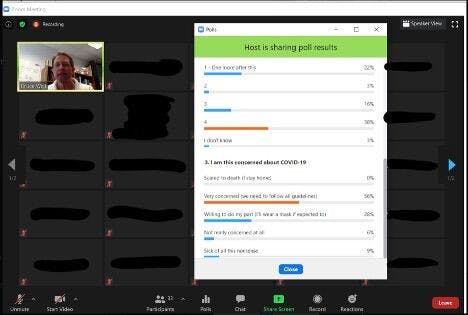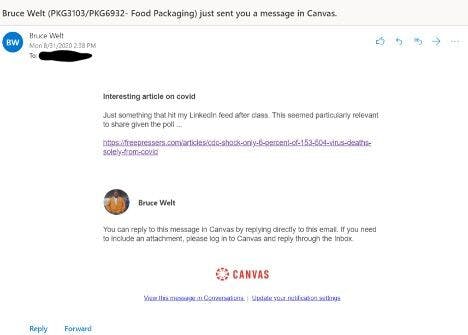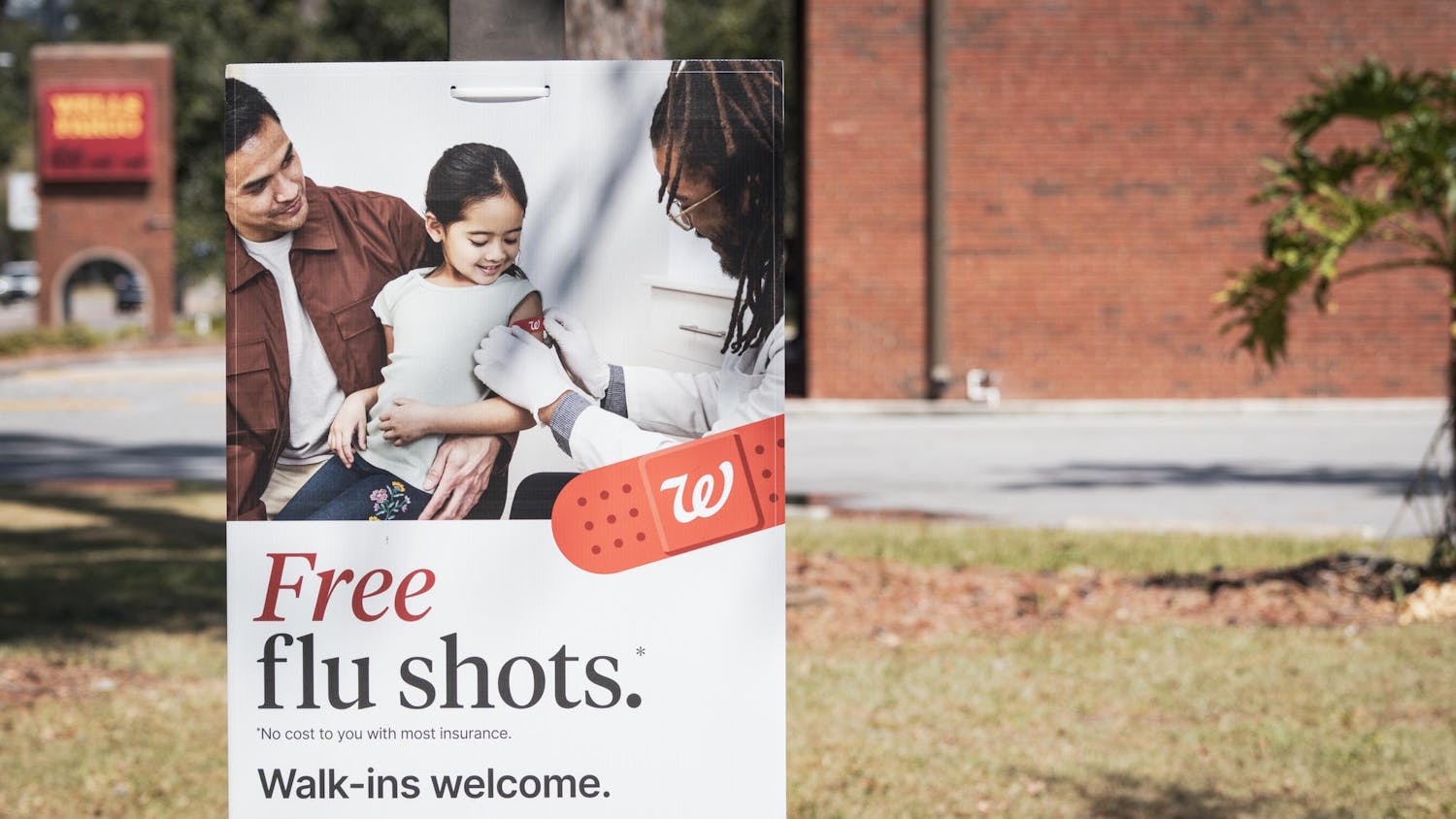
A UF professor shared an article with students from an uncredentialed website that misrepresents data about COVID-19 death rates.
UF agricultural engineering professor Bruce Welt shared an article containing misleading statistics about the U.S. COVID-19 death toll of 182,622 with his class of more than 30 on Aug. 31, the first day of the Fall semester.
The information included in the article misconstrued data from the CDC to downplay the fatality of the virus. President Donald Trump shared this same information in a tweet that was taken down by Twitter and flagged as misinformation. The Associated Press reported that this misconstrued analysis of a CDC statistic originated from the group QAnon, which gained notoriety as early as 2017 for its baseless, and often anti-semitic, conspiracy theories.
UF administration declined to comment on the specific actions of Welt and questions regarding the university’s stance on the information presented in the article. Instead, UF spokesperson Steve Orlando cited the university regulation on academic freedom and responsibility, which Orlando says UF expects faculty to abide by.
“A university instructor is a citizen, a member of a learned profession, and an academic officer of the University,” the UF regulation reads, in part.
It also states that instructors have “a responsibility to be forthright and honest in the pursuit and communication of scientific and scholarly knowledge.” It doesn’t explicitly state anything about false information.
The document warns that these roles are under public scrutiny, saying instructors “should therefore at all times exercise appropriate restraint and good judgment.”
Agricultural and Biological Engineering department chairwoman Kati Migliaccio did not respond to multiple attempts to be reached.
Welt told The Alligator that he shared the article with students because it was a radically different assessment of the pandemic and brought up questions of a difference between dying “of” COVID and dying “with” COVID.
“I don't care what your source is,” Welt said. “It's going to take a long time to figure out what that information is.”
The CDC statistic was updated to include comorbidity, often being the presence of an underlying condition that worked in tandem with the virus in deaths attributed to COVID-19, according to a recent interview with NIAID director Anthony Fauci.
COVID-19 was the underlying cause of death in 92% of death certificates that mention the virus, according to CDC Mortality Statistics Branch Chief Robert Anderson. CDC research has also shown that 45% of Americans have an underlying condition that can put them at greater risk if they contract the virus.
The article shared by Welt made mention of the original article tweeted by Jenna Ellis, a senior legal adviser for the Trump campaign, on fringe right-wing media platform The Gateway Pundit.
The Gateway Pundit is an opinion source that has a pronounced conservative slant and is not a source of factual information, said Frank LoMonte, director of the Brechner Center for Freedom of Information.
“People are entitled to voice their opinions and they should, but it's certainly not something that people look to as an authoritative reference source,” he said.
Welt wrote that he discovered the article via his LinkedIn page in a Canvas message sent to his food packaging class.
The Alligator found multiple copies of the article shared by Welt on different website URLs.
These sites are made to look like news organizations, but don't actually have reporters that go out in the field and gather news, LoMonte said. They usually consist of information that is slanted, opinionated or even completely fabricated.
This is what LoMonte calls “pink slime,” a term borrowed from the meatpacking industry where filler is passed off as meat. In this context, it’s news-like organizations that aren’t “really healthy,” for you.
“I think that's what you're seeing across the web when you see the same story and the same image, over and over again that has a pronounced ideological slant to it,” LoMonte said. “Often, that is an impersonator site.”

In the Canvas message, Welt told his students he shared the article with them because it pertained to a poll he had created to gauge students’ concern about COVID-19. The poll’s options, also provided by Welt, ranged from “scared to death,” to “sick of all this nonsense.”
More than half of students participating in the poll answered that they were “very concerned.”
“I wanted to see if students were upset that we weren't in the classroom,” Welt said. “I prefer to be in the classroom rather than online, but, you know, I guess, that's what it was.”
It was Welt who decided to hold his class online in anticipation of all classes possibly being moved online again by an administrative decision this Fall semester.
Welt said that he agrees with the notion that people should be wearing masks and washing their hands. His main concerns are about the future.
“It's a valid question to ask at what point do these measures that are clear infringements of individual liberty — when they are retracted,” he said. “I am not interested, necessarily, in a new normal.”
In email correspondence with The Alligator, Welt sent four more articles from Fox News, The Gateway Pundit, The Free Pressers and PJ Media, with a warning to the reader to “think for yourself.”
Welt explained that this discussion did not take place in his class, and the poll was only to probe his students’ concern about the virus. The article was meant to be an “FYI,” said Welt.
“I don't know who the author was. I didn't really investigate the details of the article,” he said. “I thought it was an interesting article.”
The First Amendment protects and encourages the exchange of opinions and ideas, even if they're not well-founded, said LoMonte.
“I would never tell somebody you should be stopped from sharing a website that interests you,” LoMonte said. “But I will say it's not a good practice to go around forwarding things that you represent as being well-researched fact if you're not absolutely sure that that's true.”
LoMonte, who teaches a news literacy class at UF, spoke on the importance of giving students the tools to evaluate news sources.
“Just because somebody is very good at engineering or very good at medicine may not mean that they're especially good at reading news,” LoMonte said.
When asked if he should’ve included a disclaimer in his sharing of the article that it may not contain well-researched information, Welt disagreed.
“We're trying to develop people with critical thinking skills, and I don't think that you have to sugarcoat everything with a trigger warning or all of that nonsense,” Welt said.
“The unfortunate thing is not so much that there are websites putting a partisan spin on facts, but that people share and amplify them as if they were reading well-researched, objective facts,” LoMonte said.
“I didn't write the article,” Welt said. “I think that it is appropriate for students to use critical thinking in anything they read so — it's not anything that anyone teaches.”





